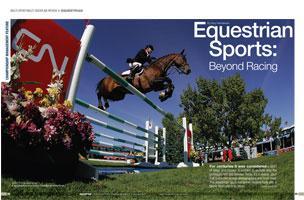
For centuries it was considered a sport of kings and nobles. It evolved to include only the privileged, rich and famous. Today, it's a sleeper sport that is enjoyed across demographics and state lines. The equestrian sport has grown exponentially and is taking destinations by storm.
Rich in History
Remarkably, horses were indigenous to North America but became extinct after the Ice Age and were not present on the continent until Columbus' voyage of 1493. After Europeans reintroduced the breed, North American horses rapidly grew to hold status in our history books through their important roles in transportation, agriculture, and warfare competition.
 |
| Grand Prix level jumping. © Bob Langrish courtesy Lexington Convention and Visitors Bureau |
The first record of an equestrian contest as a sport dates back to 682 BC with a four-horse chariot race at Greece's 25th Olympiad. However, it wouldn't be until 1868 that the first competition began at the royal Dublin Horse Show and the sports' popularity quickly spread throughout Europe and North America.
In 1900, the Olympic Games included Equestrian events in Jumping, and later added Dressage and Eventing. These original three are still the only disciplines recognized by the Olympic Games today and the only events where men and women compete collectively.
This sophisticated sport was sanctioned in 1917 with the Association of American Horse Shows, eventually becoming the United States Equestrian Federation in 2003. The USEF serves as the National Governing Body for Equestrian Sports and selects, trains and funds the United States Equestrian Team for international competitions including the Olympic Games as well as a multitude of other services. Today there are more than 91,000 members and they sanction events throughout the world.
Partnering to promote the sport is the United States Eventing Association and the United States Equestrian Team Foundation.
The USEA is a 14,000 member group organizing approximately 280 competitions annually. The USET provides funding for the elite and developing athletes and horses.
The international governing body of equestrian sports is the Federation Equestre International and is recognized by the International Olympic Committee. The FEI has over 130 member countries and establishes rules and regulations for international equestrian events.
It's Not Just Racing
Names like the Kentucky Derby, the Preakness and Belmont Stakes roll off our tongues easily, but when it comes to horses most people are generally unfamiliar with equestrian sports.
 |
| Jumping Competition. © Bob Langrish courtesy Lexington Convention and Visitors Bureau |
The Kentucky Derby is arguably one of the most celebrated competitions among the majority of the population. Hollywood celebrities, socialites and horse lovers all line up in their finest attire and eye catching hats to attend this nationally televised event every May and hold their breath for two minutes to crown the winner in roses.
But equestrian sports are not just about thoroughbred racing, there is far more than meets the eye. Seven equestrian disciplines vie in international competitions – Jumping, Dressage, Eventing, Reining, Vaulting, Endurance and Driving. Polo and Rodeo competition also fall in the spirited equestrian category.
Each discipline has unique competitive traits requiring a variety of venues, accommodations and amenities during competition. Some of the most popular forms of competition throughout the United States are horse shows, where the horses and riders compete in a wide variety of categories.
What They Are Looking For
Planning an equestrian event can be a daunting task. Like most events it takes time and lots of preparation to ensure that the event is not only successful for the riders and spectators but for the horses as well.And like most events, securing the right venue for your event is key.
The World Equestrian Games are held every four years, two years prior to the Olympic Games and are slated for September25 – October 10, 2010, at the Kentucky Horse Park in Lexington, Kentucky, a 1200 acre premier equestrian facility. This year will mark the first time in its history that the Games will be held in the United States and has been in the planning stages since Lexington was awarded the bid in December 2005.
"The Kentucky Horse Park, its land and facilities are truly the reason that it was chosen to be the first host venue in the United States," said Amy Walker, public relations manager of the 2010 Alltech FEI World Equestrian Games. "We are so proud of our bluegrass landscape and the combination of urban and rural areas here in Lexington. We are so excited to showcase that to our visitors from all over the world."
The event is expected to draw 60 countries with an estimated 800 riders competing, according to the Alltech FEI website. The Games will be broadcast on NBC and will have an estimated statewide economic impact of $150 million.
"We are providing such a great avenue for these games to be held that the Europeans have never seen before," said Walker. "In Aachen, Germany, in 2006 the games were played on 40 acres – that is the front parking lot of the Kentucky Horse Park. It's such a treasure, we can host eight world competitions from one location."
The venue is a major part of the event planning process but there are plenty of other concessions to consider.
"Every equestrian event is different," said Rebecca Pennington, owner of Mane Events in Houston, Texas. "Before I begin planning, I need to know up front how many horses and riders are expected because everything is based on those numbers. That tells you how many judges you will need, how many rings and what size arena. I also need to know what level they are riding at and if it's a breed show versus a discipline show."
 "You have to have accommodations for all of them as well as adequate parking for the trailers, cars and trucks and as well as the number of stalls required to accommodate the horses," Pennington continued.
"You have to have accommodations for all of them as well as adequate parking for the trailers, cars and trucks and as well as the number of stalls required to accommodate the horses," Pennington continued.
Walker agrees, "Our first focus is on competition, making sure we have adequate equine and human athlete facilities for them to compete at the pinnacle of their careers. We could have 750-900 horses here over the 16 days, fortunately Kentucky Horse Park can accommodate up to 1200 horses."
Parking plays a major role in equine events but another consideration is location. Although most participants drive, there are events where the airport facilities are crucial.
For example, there are three airports conveniently located within close proximity of the Kentucky Horse Park which bodes well for securing such notable events as the Alltech FEI World Equestrian Games.
What They Are Offering
Equestrian competitions, horse racing and horse shows are literally popping up all over the country. You can find them in small town corals, on expansive farm lands, or in a 20,000 seat arena in a major metropolitan city.
Ocala, Florida, is known as the Horse Capital of the World which is highly debated between Ocala and Kentucky according to Matt Dunn, tourist development sales manager for the Ocala Sports Commission.
"The reason we can claim this is because we have more horses and more breeds per capita than any other location in the world," he said.
Ocala hosts multiple equestrian events on an annual basis and the economic impact of the thoroughbred industry is over $1.3 billion annually. There are 431 thoroughbred breeding and training farms covering more than 70,000 acres and Ocala boasts an excellent location and amenities.
"From a regional standpoint, we are centrally located within the state of Florida," said Dunn. "Ocala has a private airport and there are international flights every day related to the equestrian business."
St. Charles, Missouri, is one of those destinations that has found its niche with equestrian sports. As home to the National Equestrian Center, a 650 acre equestrian and sports complex that boats 650 stalls, two indoor heated arenas and a large outdoor arena, St. Charles will host 67 equestrian events in 2010 alone.
"It's definitely a big part of what we do on the sports side," said Greg Maxon, group travel and sports sales manager for the Greater St. Charles Convention & Visitors Bureau. "It's definitely a niche market for us."
The equestrian market provides approximately 3,500 room nights annually and an estimated economic impact of $679,000 for St. Charles.
Several things make St. Charles such a draw for equestrian events, "It's definitely the quality of the facility," said Maxon. "The way it was built and maintained and the staff. They know how to take care of the participants and the horses. Everything from the stalls to the center arena where they will be performing."
The Wills Park Equestrian Center in Alpharetta, Georgia, provides 298 stalls and a covered ring measuring 150- by 350-feet with its own show office, announcer's booth, viewing room and ample seating. There are also two uncovered rings among the 50 acres.
"Horseshows are weekend business," said Katie Reeder, public relations manager for the Alpharetta Convention & Visitors Bureau. "They bring in additional room nights and the larger events will bring in over 200 room nights. That really supports the economy and that weekend business is key."
Fairgrounds are popular venues to host equestrian events and are becoming more up to date with available amenities for events.
"We have three county fairgrounds that run equestrian events," said Kerrie Kuiper, marketing director of the Fort Dodge Convention & Visitors Bureau. "We also have community rodeo grounds that run additional events."
The Webster County Fairgrounds provides both an indoor and outdoor arena, features 60 box stalls and camping facilities.
Even college campuses are looking to get in on the action. The University of Miami at Ohio offers the Equestrian Center to students and the Butler County Convention & Visitors Bureau is looking to utilize that facility to draw equestrian events to the area.
"We are looking at the equestrian events market because it's a different avenue than the mainstream events," said Stephanie Gigliotti, sales manager of the Butler County Convention & Visitors Bureau. "In our county we have three great facilities and we are learning more about what the events need. All three of them have indoor and outdoor arenas as well as boarding stalls."
As with any event, venue is often at the top of the list, but what follows is usually subjective based on the event. In equestrian events, it's probably ease of location and accessibility.
Most equestrian events are family driven; each rider can have 3-4 family members accompany them to each competition. That translates to added room nights and added revenue for the destination. But most participants drive to the events and that requires a good location, great restaurant choices and added attractions.
"The main thing for us is our destination is centrally located and easily accessible from the interstate or the airport," said Maxon. "As well as the quality of our facilities and the attractions we offer while they are visiting."
St. Charles is located only 30 minutes from St. Louis and has a nationally registered historic district with 125 shops and a multitude of restaurants.
Likewise, Alpharetta is just up to the road from Atlanta and the north Georgia mountains. "Within the park, there are over 750 acres of park land," said Reeder. "It's easy to go out and do something free and family friendly."
And Fort Dodge offers some great historical attractions. "We have an excellent frontier museum with Fort Museum and Frontier Village with a stockade, and we have a racetrack for stock car racing."
"Our location is unique being in the center in the state," Kuiper continued. "We are pulling a lot of guests from Minnesota, Wisconsin and Illinois."

